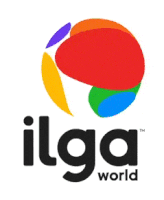
The International Lesbian, Gay, Bisexual, Trans and Intersex Association (ILGA) is a LGBTQ+ rights organization.
Vaginoplasty is any surgical procedure that results in the construction or reconstruction of the vagina. It is a type of genitoplasty. Pelvic organ prolapse is often treated with one or more surgeries to repair the vagina. Sometimes a vaginoplasty is needed following the treatment or removal of malignant growths or abscesses to restore a normal vaginal structure and function. Surgery to the vagina is done to correct congenital defects to the vagina, urethra and rectum. It may correct protrusion of the urinary bladder into the vagina (cystocele) and protrusion of the rectum (rectocele) into the vagina. Often, a vaginoplasty is performed to repair the vagina and its attached structures due to trauma or injury.

Intersex medical interventions (IMI), also known as intersex genital mutilations (IGM), are surgical, hormonal and other medical interventions performed to modify atypical or ambiguous genitalia and other sex characteristics, primarily for the purposes of making a person's appearance more typical and to reduce the likelihood of future problems. The history of intersex surgery has been characterized by controversy due to reports that surgery can compromise sexual function and sensation, and create lifelong health issues. The medical interventions can be for a variety of reasons, due to the enormous variety of the disorders of sex development. Some disorders, such as salt-wasting disorder, can be life-threatening if left untreated.

The history of intersex surgery is intertwined with the development of the specialities of pediatric surgery, pediatric urology, and pediatric endocrinology, with our increasingly refined understanding of sexual differentiation, with the development of political advocacy groups united by a human qualified analysis, and in the last decade by doubts as to efficacy, and controversy over when and even whether some procedures should be performed.

Müllerian agenesis, also known as Müllerian aplasia, vaginal agenesis, or Mayer–Rokitansky–Küster–Hauser syndrome, is a congenital malformation characterized by a failure of the Müllerian ducts to develop, resulting in a missing uterus and variable degrees of vaginal hypoplasia of its upper portion. Müllerian agenesis is the cause in 15% of cases of primary amenorrhoea. Because most of the vagina does not develop from the Müllerian duct, instead developing from the urogenital sinus, along with the bladder and urethra, it is present even when the Müllerian duct is completely absent. Because ovaries do not develop from the Müllerian ducts, affected people might have normal secondary sexual characteristics but are infertile due to the lack of a functional uterus. However, biological motherhood is possible through uterus transplantation or use of gestational surrogates.
A sexual minority is a group whose sexual identity, orientation or practices differ from the majority of the surrounding society. Primarily used to refer to lesbian, gay, bisexual, or non-heterosexual individuals, it can also refer to transgender, non-binary or intersex individuals.
Gender variance or gender nonconformity is behavior or gender expression by an individual that does not match masculine or feminine gender norms. A gender-nonconforming person may be variant in their gender identity, being transgender or non-binary, or they may be cisgender. In the case of transgender people, they may be perceived, or perceive themselves as, gender-nonconforming before transitioning, but might not be perceived as such after transitioning. Transgender adults who appear gender-nonconforming after transition are more likely to experience discrimination.

Disorders of sex development (DSDs), also known as variations in sex characteristics (VSC), are congenital conditions affecting the reproductive system, in which development of chromosomal, gonadal, or anatomical sex is atypical.

The Woodhull Freedom Foundation, also known as Woodhull Sexual Freedom Alliance, is an American non-profit organization founded in 2003 that advocates for sexual freedom as a fundamental human right. The organization is based in Washington, D.C., United States. Named after an influential member of the American woman's suffrage movement, Victoria Woodhull, its focus includes analyzing groups and individuals that seek to perpetuate a culture of sexual repression.

Complete androgen insensitivity syndrome (CAIS) is an AIS condition that results in the complete inability of the cell to respond to androgens. As such, the insensitivity to androgens is only clinically significant when it occurs in individuals who are exposed to significant amounts of testosterone at some point in their lives. The unresponsiveness of the cell to the presence of androgenic hormones prevents the masculinization of male genitalia in the developing fetus, as well as the development of male secondary sexual characteristics at puberty, but does allow, without significant impairment, female genital and sexual development in those with the condition.

Intersex people are individuals born with any of several sex characteristics including chromosome patterns, gonads, or genitals that, according to the Office of the United Nations High Commissioner for Human Rights, "do not fit typical notions of normal male or female bodies".
Anne Tamar-Mattis is an American attorney, human rights advocate, and founder of interACT. She currently serves as interACT's Legal Director.

Intersex people are born with sex characteristics that "do not fit the typical definitions for male or female bodies". They are substantially more likely to identify as lesbian, gay, bisexual, or transgender (LGBT) than endosex people, an estimated 52% identifying as non-heterosexual and 8.5% to 20% experiencing gender dysphoria. Although many intersex people are heterosexual and cisgender, this overlap and "shared experiences of harm arising from dominant societal sex and gender norms" has led to intersex people often being included under the LGBT umbrella, with the acronym sometimes expanded to LGBTI. Some intersex activists and organisations have criticised this inclusion as distracting from intersex-specific issues such as involuntary medical interventions.

Intersex people in the United States have some of the same rights as other people, but with significant gaps, particularly in protection from non-consensual cosmetic medical interventions and violence, and protection from discrimination. Actions by intersex civil society organizations aim to eliminate harmful practices, promote social acceptance, and equality. In recent years, intersex activists have also secured some forms of legal recognition. Since April 11, 2022 US Passports give the sex/gender options of male, female and X by self determination.

In 2015, Nepal introduced constitutional recognition for "gender and sexual minorities". Despite this, the rights situation of intersex people in Nepal is unclear. Local activists have identified human rights violations, including significant gaps in protection of rights to physical integrity and bodily autonomy, and protection from discrimination. A first national meeting of intersex people look place in early 2016,Organised by First openly Intersex Rights Activist Esan Regmi in Nepal. with support from the UNDP.

Intersex people are born with natural variations in physical and sex characteristics including those of the chromosomes, gonads, sex hormones, or genitals that, according to the UN Office of the High Commissioner for Human Rights, "do not fit the typical definitions for male or female bodies". Such variations may involve genital ambiguity, and combinations of chromosomal genotype and sexual phenotype other than XY-male and XX-female. Preimplantation genetic diagnosis allows the elimination of embryos and fetuses with intersex traits and thus has an impact on discrimination against intersex people.
LGBT erasure refers to the tendency to intentionally or unintentionally remove LGBT groups or people from record, or downplay their significance, which includes lesbian, gay, bisexual, transgender people and those who identify as queer. This erasure can be found in a number of written and oral texts, including popular and scholarly texts.

Seo Dong-jin is a South Korean sociologist, a cultural critic and a university professor. He was one of the first main activists of the Korean Gay men human rights association Chingusai. Aside from his activities, he introduced queer theory in Korea and had a central role in the apparition of LGBTQ+ gatherings in Korean universities.

Eric Vilain is a physician-scientist and professor in the fields of Differences of Sex Development (DSDs) and precision medicine. He is the Associate Vice Chancellor for Scientific Affairs at the University of California, Irvine Health Affairs and also the director of the UCI Institute for Clinical and Translational Science. He previously was the director of the Center for Genetic Medicine Research at Children's National Medical Center and the chair of the Department of Genomics and Precision Medicine at the George Washington University School of Medicine & Health Sciences in Washington, D.C. Vilain is a fellow of the American College of Medical Genetics, serves on the International Olympic Committee's Medical Commission, and sits on the Board of Scientific Counselors for the National Institute of Child Health and Human Development (NICHD).








